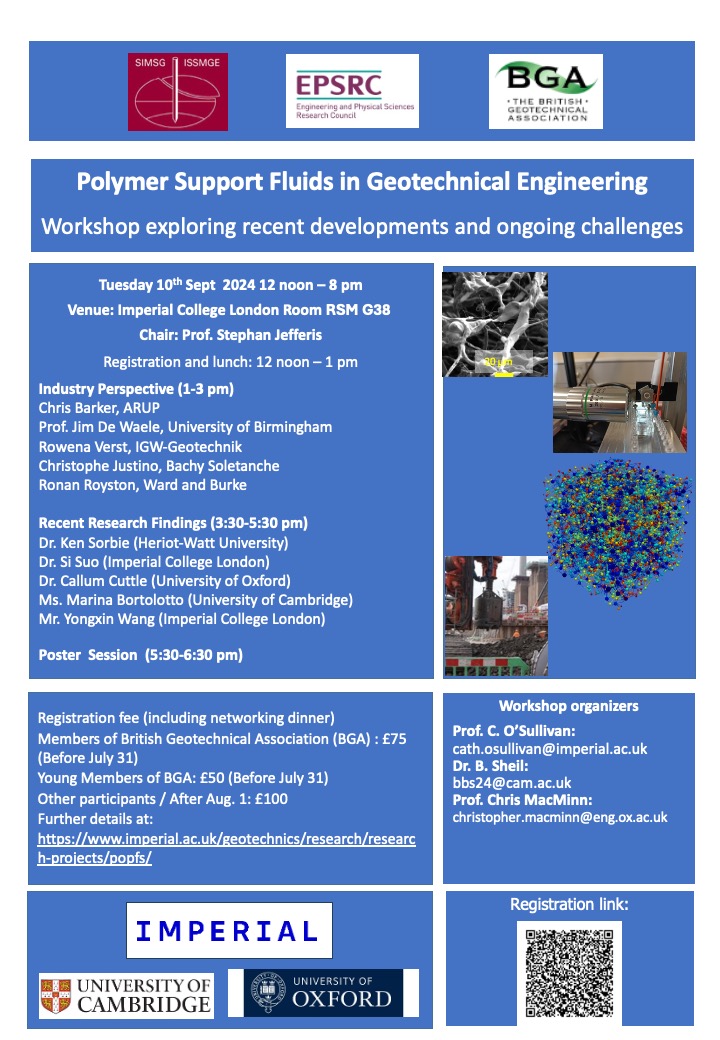PERMEATION OF POLYMER FLUIDS IN SOILS (POPFS)
Project overview
In this project engineers with experience of working with polymer-based fluids in the laboratory and on construction sites are collaborating with researchers who are experts at studying the detail of fluid flow in porous materials to get a much better understanding of how polymer-fluid based support systems work. Members of this newly formed team have backgrounds in civil engineering, mechanical engineering, and petroleum engineering and are based at Imperial College London (ICL), the University of Cambridge (UoC) and the University of Oxford (Oxf). To deliver the research we will link advanced numerical modelling (at ICL) with detailed experimental measurements (at UoC and Oxf ).
Get Involved
We are delighted to announce our industry engagement workshop to explore recent developments and ongoing challenges in the use of polymer support fluids. This will take place on Tuesday 10th Sept 2024 (12 noon – 8 pm) in Imperial College London Room RSM G38. The workshop will be chaired by Prof. Stephan Jefferis. Speakers include Chris Barker (ARUP), Prof. Jim De Waele(University of Birmingham), Rowena Verst (IGW-Geotechnik), Christophe Justino (Bachy Soletanche), and Ronan Royston(Ward and Burke). Our research team will also update on our recent progress and future plans. Our registration link is here. Direct inquiries to Catherine O'Sullivan
Meet the team
Investigators
The project is lead by Prof. Catherine O’Sullivan, Prof. Martin Blunt, Dr. Brian Sheil, Prof. Chris MacMinn and Prof. Stephan Jefferis.

Researchers
The researchers working on this project are Dr. Si Suo, Dr. Callum Cuttle, Marina Bortolotto, and Yongxin Wang.

Background
Project overview:
When tunnels for railways or deep foundations to high rise buildings are built, the first step is to excavate a large hole in the ground. A key challenge is to prevent the excavated hole from collapsing before inserting the final, permenant structure. One way to do this is to pump a special liquid called a support fluid into the open excavated hole. Currently the fluid that is most often used is a suspension of bentonite clay. When this fluid flows into the soil around an excabayion the clay clogs the pore space in the soil at the open face, forming a layer called a filter cake, which prevents fluid and soil movement, and supports the excavation.
A newer technology has emerged that uses fluids that are polymer solutions rather than suspensions of small clay particles. These polymer fluids work in a very different way to the bentonite clay suspensions. It is the high viscosity of the fluid that prevents collapse of the hole; these fluids can keep the excavation supported and safe without the need to form a filter cake. Support systems that use polymer fluids are cheaper and have a lower environmental footprint than systems using bentonite suspensions. However the interaction of the polymer fluids and the soil is more complex than the interaction between the soil and the bentonite suspensions. It is therefore more difficult for engineers designing these support systems to predict exactly how they will work and this has slowed their uptake by the construction industry. Our overall aim is to provide the fundamental science needed to reduce any technical uncertainty and therefore enable wider use of these materials. This will have both environmental and economic benefits.
Further Reading:
60th Rankine Lecture by Prof. Stephan Jefferis
Permeation Behaviour of PHPA Polymer Fluids in Sand, Ejezie et al. (2021) Geotechnique 71(7)
Funding
Engineering and Physical Research Council: EP/X034305/1, EP/X034453/1, EP/X034437/1
Contact Geotechnics
Geotechnics
Civil and Environmental Engineering
Skempton Building
Imperial College London
South Kensington Campus
London, SW7 2AZ
Telephone:
+44 (0)20 7594 6077
Email: j.otoole@imperial.ac.uk
Alternatively, you can find a member of Geotechnics staff on the Department of Civil and Environmental Engineering website.
Follow us on Twitter: @GeotechnicsICL
We are located in the Skempton Building (building number 27 on the South Kensington Campus Map). How to find us


